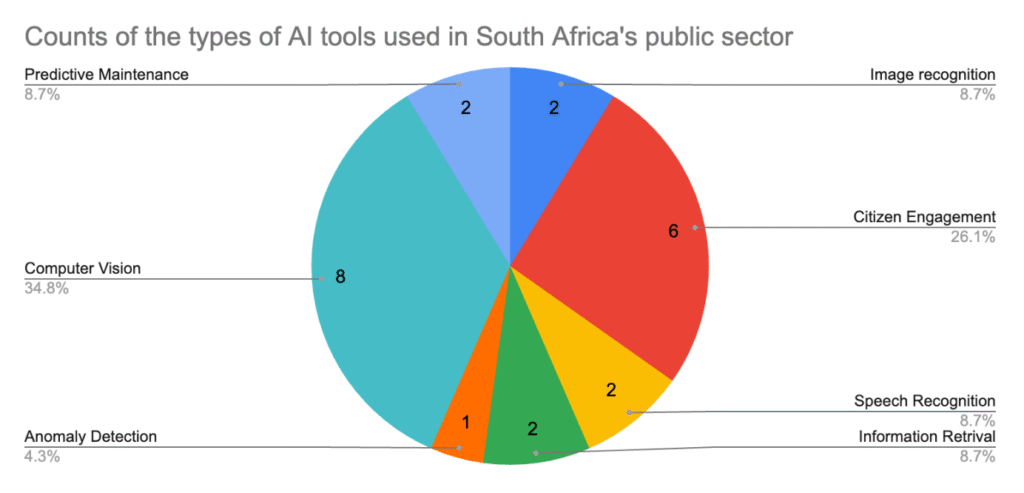The Policy Innovation Lab is pleased to share the June 2025 update of our catalogue of Artificial Intelligence (AI) tools in Government. This searchable catalogue tracks and analyses tools used in and by governments. It is curated from the Public Sector Tech Watch dataset of digital tools employed in the European Union (EU) and then refined to focus specifically on AI applications most relevant to the South African context. Since the last update in November 2024, we have expanded the catalogue by including AI tools that are locally being used and in development already in South Africa.
The June 2025 update introduces:
- 23 South African AI tools currently deployed across public sector domains found using internet searches.
- 17 additional EU-based tools, included in the June Public Sector Tech Watch dataset[1].
In this article we discuss what types of tools are being used in South Africa and the latest tools used in the EU.
South Africa
The South African use cases demonstrate the deployment of AI for health, safety and conservation, which we discuss below.
A significant trend in South Africa is the dominance of conversational AI and chatbots for engaging with citizens. Examples include MomConnect and Zuzi Chatbot, which operate on widely accessible platforms such as WhatsApp and SMS. MomConnect, launched in 2014, continues to improve maternal health by sending personalised SMS advice to expectant mothers. Zuzi is a trauma-informed chatbot that supports survivors of gender-based violence with information on rights, legal services as well as sexual and reproductive health.
Another rapidly advancing application of AI in South Africa is computer vision for security and identity verification. The Council for Scientific and Industrial Research (CSIR) Body and number plate recognition system, and the University of Johannesburg’s Facial Recognition pioneering contactless access control using face, body and licence plate recognition. Cape Town’s Smart Safety Technology Suite employs AI to analyse CCTV footage, detecting gunshots and tracking suspects in real time to accelerate law enforcement responses. Similarly, computer vision is also strengthening environmental and infrastructure management. The CSIR Meerkat WASS & GSCR Anti-Poaching Surveillance Systems and FruitPunch AI’s drone-mounted cameras help combat rhino poaching by distinguishing humans and animals and alerting rangers immediately. SANRAL, South Africa’s national roads agency, is piloting AI-driven pothole and crack detection, while UCT’s shuttle fleet monitoring system uses behavioural analytics to improve road efficiency and service quality.

While South Africa’s public sector is increasingly embracing AI to enhance service delivery, strengthen security and improve citizen engagement, ethical considerations around surveillance, privacy and accountability must remain central to policy design. The update illustrates that South Africa is pursuing AI adoption in the public sector, but that it is not widespread and is limited in scope.
The European Union
The catalogue also included 17 AI tools from the EU in its update that have been identified since November 2024, highlighting new innovations with potential applications in South Africa.
Large Language Model (LLM) tools dominate the major AI tools use cases. Governments are deploying generative AI to:
- Facilitate citizen-to-government consultations (e.g. Common Ground, Netherlands)
- Enhance government-to-citizen services (e.g. Muni Chatbot, Denmark; Camilla Assistant, Italy)
- Improve internal workflows such as idea generation, document drafting and translation (e.g. GladGPT, Denmark)
Of particular interest to the Policy Innovation Lab is France’s OpenFisca, an open source “Rules as Code” framework that enables governments, civil society and developers to model laws and social policies in computable formats. It is widely used for microsimulation of tax and benefits policies, allowing policymakers to test impacts on individuals and households. OpenFisca’s approach resonates strongly with SEIAS, South Africa’s Socio-Economic Impact Assessment System, which similarly seeks to model and assess the social consequences of policy decisions.
The June 2025 catalogue update reflects the rapidly expanding role of AI in public governance across both South Africa and the EU. South Africa demonstrates progress with AI applications for citizen engagement, biometric security, conservation, and education, while new AI applications in the EU governments are for simulation, participatory governance and AI-enabled urban management.
As the catalogue grows, the Policy Innovation Lab will continue to curate and contextualise global AI applications, with the aim of informing responsible, impactful adoption of AI in South Africa’s public sector.
[1] European Commission, Joint Research Centre (JRC) [Dataset] PID: http://data.europa.eu/89h/97675d46-95d3-4bef-ab2f-d7c411e83706 [Accessed June 2025]
